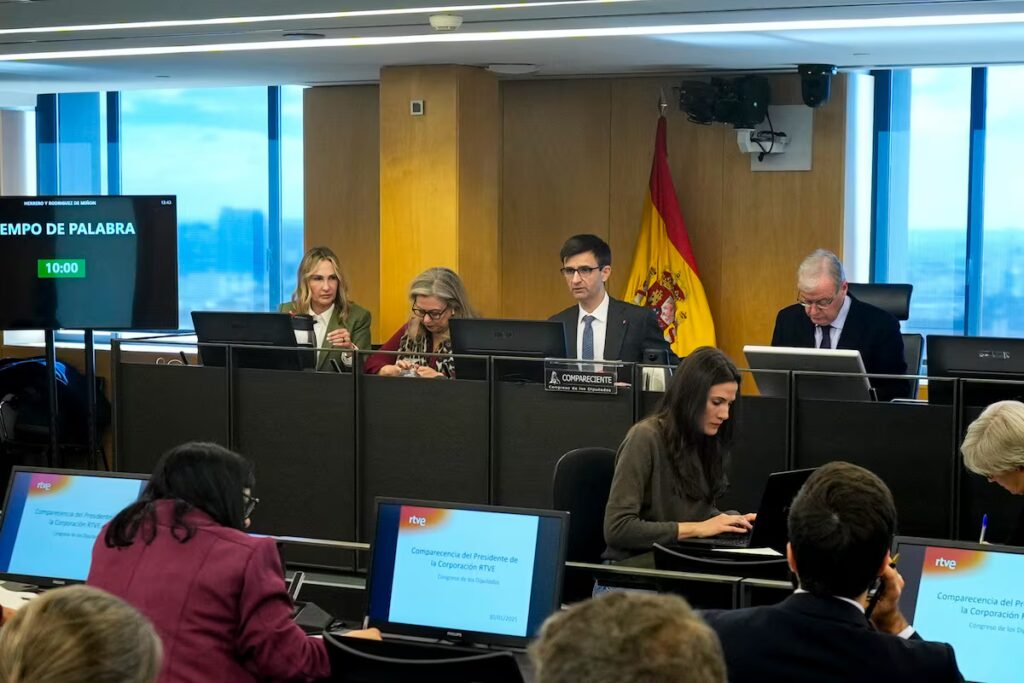
A year ago, the Government approved by decree an express reform of Radiotelevisión Española to renew the board of directors and the presidency, also reserving another fast track to be able to have a new framework mandate as soon as possible. The previous version of this rule regulating RTVE’s public service principles has been extended since 2017, when its validity expired, and the feasibility of a new framework mandate would open the door to the approval of an essential program-contract for financing in accordance with current needs. The parliamentary renewal of the governing body and presidency of the organization was carried out in record time, but the preparation of a new proposal for a framework mandate was awaited. The board of directors sent it to the Cortes last May and on Tuesday it begins a liquidation process that could have been accelerated in Congress.
Among the changes introduced by the Government decree is the modification of article 4 of State Radio and Television Law. This article now allows the proposed framework mandate to be transferred directly to the plenary session of the Congress and to make changes “which, if necessary, are formulated by the parliamentary groups for approval or rejection”. But it will be the RTVE control commission based in the Senate – where PP and Vox have the majority of its members – that will initiate the parliamentary process through a specific subcommission. A process that can last as long as in the previous legislature, where another similar subcommittee established in 2021 expired without results “due to dissolution” before the July 23, 2023 elections.
The new framework mandate proposal was approved on May 13 with 11 votes in favour, one against and three abstentions in the RTVE board of directors, where the representatives proposed by the parliamentary investiture groups are the majority. The governing body of the corporation sent it to the Cortes on May 23 in this order: first to Congress, at 12.53. that day; half an hour later, in the Senate; and, finally, to the presidency of the RTVE control commission based in the Chamber and chaired by PP senator Antonio Silvan. The board of directors unanimously approved the delivery to the three instances. And parliamentary sources explain that the Congressional Board in turn sent the proposal to the mixed commission “because, in general, it is the body in charge of relations with RTVE”. The same sources add: “This body has, a priori, the competence to promote this procedure.”
It was the President of the Senate, Pedro Rollán (PP), who, after receiving the proposal for the new framework mandate from the RTVE board of directors, forwarded it to the parliamentary control commission following an agreement of the Upper House council on 27 May. The decision was signed in a resolution to which EL PAÍS had access and which also announced the transfer of the proposal to the parliamentary groups, as well as the communication “of this agreement to the Congress of Deputies”. Several groups that are part of the commission admit that the arrival of the new framework mandate occurred due to “inertia”, without taking into account the provisions of the decree approved a year ago.
Parliamentary sources, questioned by this newspaper about the elaboration in the new subcommittee and not in the plenary session of the Chamber, recall the existence of a resolution of the Councils of Congress and Senate approved in 2007 which established that the proposed framework mandate “approved by the mixed commission will subsequently be submitted to the plenary session of Congress and the Senate for debate and voting, without the presentation or voting of individual votes being possible at this stage”. This resolution therefore provided that what was agreed in the parliamentary commission would be voted on in Congress as it arrived, but the decree approved a year ago by the Government which reforms the legislation State Radio and Television Law establishes another possibility. In the decree, the new wording of Article 4 of the law is as follows: “The proposed framework mandate will be submitted to the Plenary Session of the Congress of Deputies, together with the proposals to modify it which, where appropriate, are formulated by the parliamentary groups for approval or rejection, by absolute majority. The resulting proposal will be submitted to the ruling of the Senate, which will be able to approve, veto or modify it by absolute majority, within a period of 20 days.”
The work of the new subcommission will begin this Tuesday without a clear conclusion horizon. Sources from the PSOE parliamentary groups and Sumar, members of the control commission, admit that the process could have been accelerated in the plenary session of the Congress, but are waiting to see how the sessions will be organised. “If we perceive a clear desire to unjustifiably delay the works, we will have to propose alternative paths,” says the socialist spokesperson of the commission, Vicent Sarrià. And he adds: “In the previous legislature there were already sufficient appearances and information. Now we will not question the work of the commission itself, but we hope that there is a commitment on its part to speed up this process as much as possible and that at the latest after the parliamentary inactivity in January we can have a document to submit to Congress”. For his part, Sumar’s spokesperson on the same commission, Francisco Sierra, is also in favor of starting work, although he warns: “If there is no response within two months, after January, on a closing document, we will ask the Congressional Council that the new framework mandate be drawn up in accordance with the decree. This is not the time to start asking for appearances, but to establish a timetable.”





